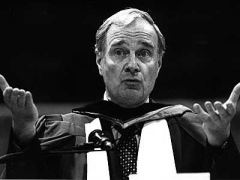All three candidates vying for the leadership of the new Conservative Party of Canada are now in the heart of their respective campaigns. As Tony Clement, Belinda Stronach and Stephen Harper criss-cross the country, signing up new members and impressing current ones, here is a comparison of their campaigns.
On the Liberal sponsorship scandal
As we’re all aware, the latest scandal has hit the Liberal Party and it has hit it hard. Dr. Hill, Leader of the Opposition, has been trying to crack this one wide open. The next leader of the Conservative Party of Canada will have to be effective in pointing out Liberal lies so how do Stephen Harper, Tony Clement and Belinda Stronach approach this issue?
“Does Paul Martin seriously expect us to believe that he is a stranger in the Liberal Party? He was not only Minister of Finance during the Sponsorship scandal, but he served as the senior minister for Quebec in the last election. He sat on the cabinet’s Quebec Committee with Alfonso Gagliano – a man whom Martin has just fired. I demand to know the reason he was fired.” — Stephen Harper
“The only way to clear the air is for the Liberal Party to return the money it received from communications companies involved in this scandal … In addition, The Chief Electoral Officer should investigate all other Liberal Party financing to ensure that no taxpayer dollars ended up in Liberal Party coffers” — Belinda Stronach
Quebec
Some say the battle will be won and lost in this province of many ridings and few members. Indeed, if either candidate is to win Quebec and thus win the race, membership sales will be key.
Belinda Stronach is on her way to winning the province as she has received endorsements from 42 Riding Association Presidents and from 5 former MPs. There are 75 ridings in Quebec and Belinda Stronach has done well to capture the votes there.
Stephen Harper, it seems, is not doing as well in Quebec. He sent out an email requesting that his supporters, “Help [him] sell memberships in the province of Quebec” and “call your friends or relatives in Quebec and get their information to fill out the (membership) form and sign them up for the new party”. This seems to stand in stark contrast with Belinda Stronach’s organizational efforts in Quebec as she has most of the Tory organizers working/volunteering for her there.
So, Stronach and Harper are making varying degrees of progress in Quebec, yet Tony Clement hasn’t made too much noise there. If it is any indication of Tony’s success in Quebec, he is the only leadership candidate without a goofy photo with the Quebec city Carnival’s Bonhomme de Neige. While Stronach and Harper are sweeping through Quebec, Tony has decided to go to Saskatchewan.


Policy
Where Tony Clement has turned some heads, however, has been on a “radical” (according to the Toronto Star no less) tax reform policy. This leadership candidate for the Conservative Party of Canada has proposed that the first $250,000 of earnings by every Canadian should be tax free.
“This is about giving young people an opportunity to start their lives here in Canada … A lot are immersed in student debt, they’re looking for an opportunity to make a start in life and here’s a chance if you stay in Canada, the first $250,000 you make is tax free.” — Tony Clement
On tax policy, Belinda Stronach has not been shy. She has pledged to make mortgage interest partially tax deductible and to allow parents to deduct their children’s post-secondary tuition from their income taxes. She has also promised to repeal the tax on capital investment.
Stephen Harper, meanwhile, continues to espouse lower corporate taxes instead of corporate handouts. However, Mr. Harper also proposes to eliminate subsidies given to the Maritimes by the Atlantic Canada Opportunities Agency. This position is sure to be controversial in the East.
Conclusion
All three leadership campaigns seem to have their advantages and disadvantages. However, a definite advantage must be recognized in the campaigns of Belinda Stronach and Stephen Harper over that of Tony Clement. The race is still wide open, however, as the upcoming all-candidates debate on the 22nd could provide some surprises and will likely provide momentum to the candidates that do well.
 The Auditor-General’s report came out Tuesday afternoon and it is quite damning to the Liberal Party. Auditor-General described Liberal government abuses as ‘outrageous’. The word ‘fraud’ appears in the document detailing the $250 million in advertising programs and sponsorships that were channeled through Liberal party supporters who had a take-home share of $100 million.
The Auditor-General’s report came out Tuesday afternoon and it is quite damning to the Liberal Party. Auditor-General described Liberal government abuses as ‘outrageous’. The word ‘fraud’ appears in the document detailing the $250 million in advertising programs and sponsorships that were channeled through Liberal party supporters who had a take-home share of $100 million.